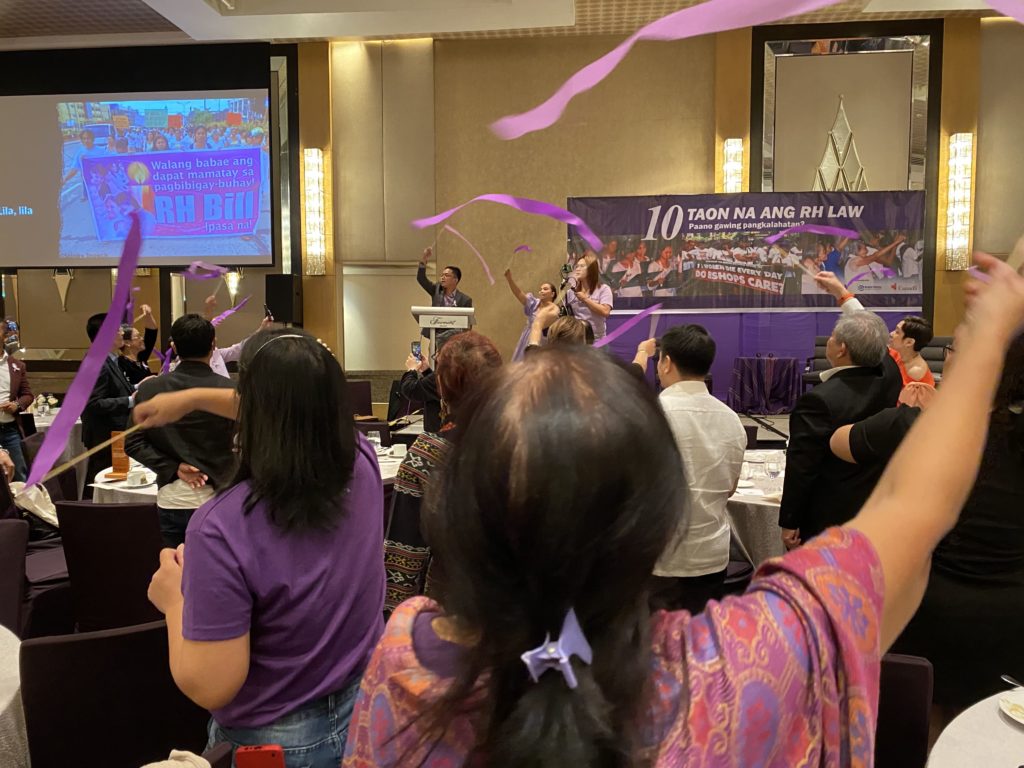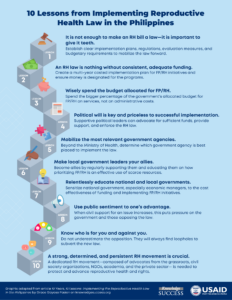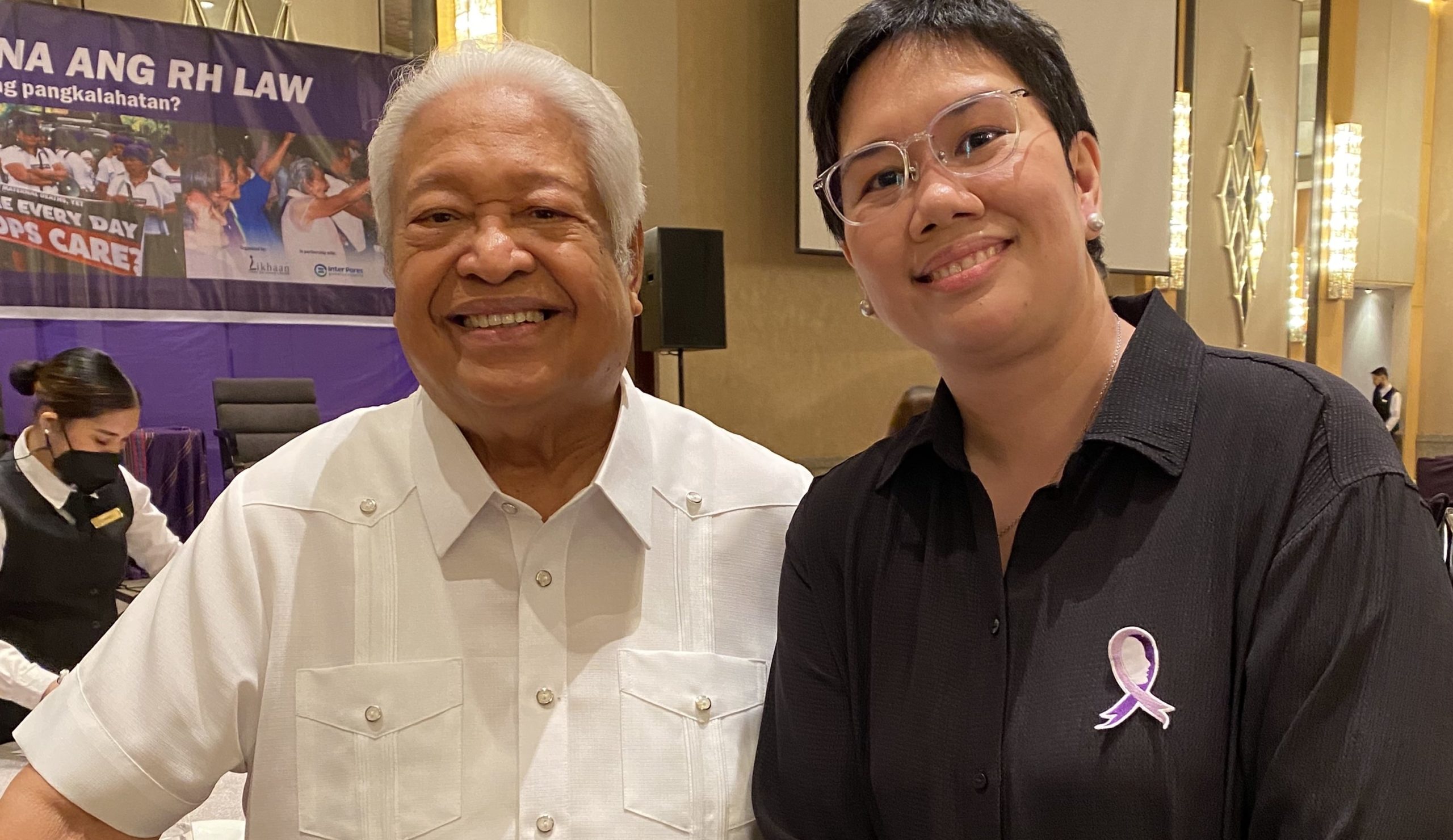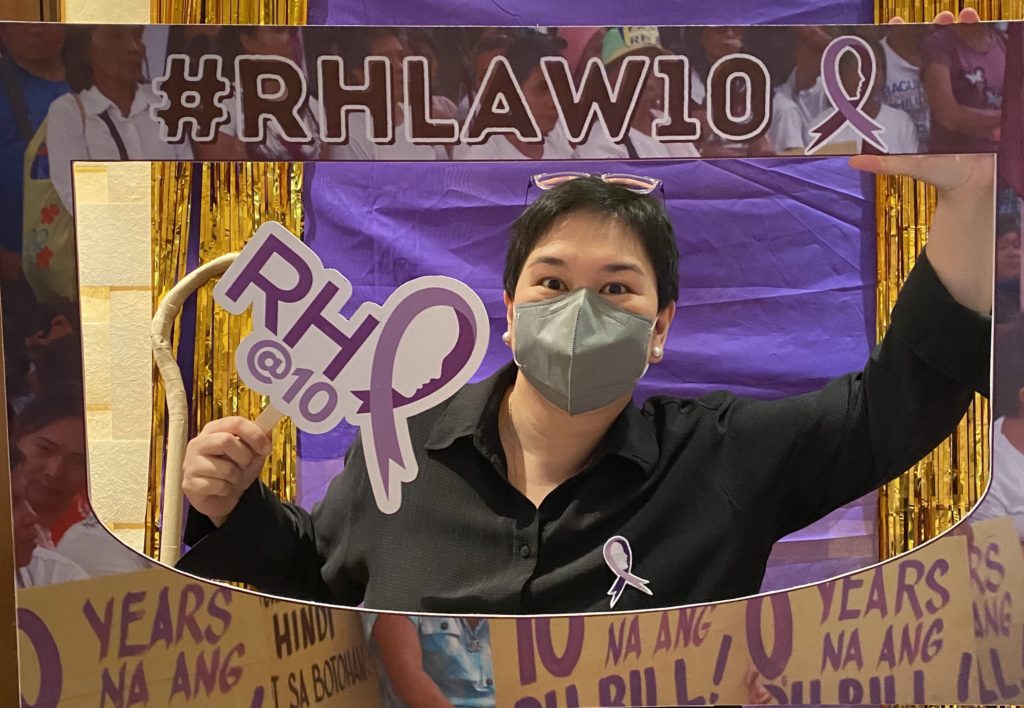10 Years, 10 Lessons: Implementing the Reproductive Health Law in the Philippines

NEW! You can now listen to this article in Tagalog here.
The translated audio version of this article into Tagalog is provided through the use of AI-powered technology. The voices are AI-generated and do not represent the authors or their actual voices.
Reproductive health (RH) advocates and champions in the Philippines faced a tough 14-year long battle against powerful groups and strong oppositions to turn the Responsible Parenthood and Reproductive Health Act of 2012 (Republic Act No. 10354) into a landmark law in December 2012. Known as the RH Law, it provides universal and free access to modern contraceptive methods, mandates age- and development-appropriate reproductive health education in government schools, and recognizes a woman’s right to postabortion care in the Philippines as part of the right to reproductive healthcare.
Enactment, however, did not guarantee immediate success. The law still had to overcome legal battles for four more years (2013 to 2017)—from overcoming challenges on the constitutionality of temporary restraining orders on contraception use—to those who were opposed to implementing its rules and regulations.
Download the guide to implement reproductive health laws. 
On December 17, 2022, RH champions, advocates, and other stakeholders gathered once again to mark the 10th year anniversary of the RH Law. Various government officials, lawmakers, and representatives from civil society organizations reminisced about their struggles, reflecting on the challenges and lessons a decade after the law’s enactment and calling on government and key partners for additional commitments moving forward. There have been noteworthy successes, with public support and demand for FP/RH remaining strong and with other FP/RH-related bills becoming laws. Yet, challenges still exist, including declining budgets and finding ways to integrate the law into local government units. As the former Executive Director of the Commission on Population and Development (POPCOM) Dr. Juan Antonio Perez III said, “After the first decade of the RH Law, there is still work to do.”
Since the enactment of the RH Law in 2012, what lessons have RH champions and advocates learned? Here are 10 lessons from 10 years of implementing the RH Law in the Philippines.
1. It is not enough to make an RH bill a law—it is important to give it teeth.
Giving the law “teeth” means ensuring that it has clear implementing rules and regulations backed by a sufficient budget to move it forward. It also means having joint oversight meetings of various agencies and stakeholders to consistently monitor its implementation and resource mobilization.
“It is not just about crafting a bill, legislating it, and putting it into a law. What is more important is implementing it,” emphasized former Department of Health (DOH) Secretary and now Iloilo 1st District Representative Janette Garin.
2. An RH law is nothing without consistent, adequate funding.
Government leaders, both at the national and local levels, may verbally support a law, but there needs to be funding for implementation. The national government should give clear instructions to the Ministry of Budget or Finance to allocate, on an annual basis, adequate funding for the law and if possible, create a multi-year costed implementation plan for FP/RH initiatives. At the local government level, ensure that FP/RH program implementation is included in annual budget plans.
Walden Bello, one of the principal sponsors of the Philippines’ RH Bill, also shared his thoughts on this: “A major step to address the funding issue would be for the law’s implementation being designated by Congress as a ‘priority medical concern,’ which would entitle it to the level of funding such a designation mandates.”
3. Wisely spending the budget allocated for FP/RH provides indisputable evidence to continue funding and implementing the law.
Spend the bigger percentage of the government’s allocated budget for FP/RH on services, not on administrative costs. Most of the time, the government spends a large portion of its FP/RH program budget on training and seminars and less on procuring commodities or improving services. Spending on administrative matters is necessary, but an FP/RH program should not be purely administrative in nature because people also need support and services—both of which are essential components.
According to former DOH Secretary Garin, “If the budget is spent mostly on administrative costs and there are no services provided, surely, it will be a big stone against the law…I amended things so that the budget for reproductive health will really be spent on people. That is why, when the law was challenged in the Supreme Court, we did not have difficulty showing that ‘Here we are, already implementing the law that will actually transcend to services for women.’”

4. Political will is key and priceless to successful implementation.
Clichéd as it may seem, it is political will that propels government leaders to find ways to fund and speed up implementation within their respective jurisdictions. Political will moves leaders to purchase and distribute contraceptives, to provide comprehensive FP/RH services, and to implement comprehensive sexuality education (CSE) programs despite opposition from influential anti-RH groups at both the national and local levels.
“Local governments have access to the resources. It is really a matter of prioritizing…We have a very small budget in our city but if you know that you need to put your heart and your funds where it should be, it is possible,” shared Isabela City Mayor Djalia Hataman of Basilan, a province in the southernmost part of the Philippines.
Most importantly, lead implementing agencies, such as the Ministry of Health, must be at the forefront of having the political will to advocate for sufficient funds, provide support, and enforce the RH law.
5. Mobilize the most relevant government agencies to implement the law.
It seems logical and easy to understand, yet the importance of relevance is sometimes overlooked. Beyond the Ministry of Health, determine which government agency is best placed to implement the law. Engage the agency focused on population and development. Involve the agency responsible for appropriating the budget for the RH law. Work with the Ministry of Education to integrate CSE into the basic curriculum. Most importantly, ensure that the law and its implementing rules and regulations clearly state the roles and responsibilities of these relevant government agencies.

6. In a decentralized form of government, the power is with local government leaders. Make them your allies.
The devolution of the health system in the Philippines puts the power and the money to implement the RH Law in the hands of local chief executives. Advocates helped them become allies by regularly supporting them and educating them on how prioritizing FP/RH is an effective use of scarce resources that ultimately translates to material cost savings, which can then be reinvested in other priority sectors.
As Mayor Hataman shared, “It was Likhaan* who molded me to be who I am right now. They introduced me to reproductive health and it was my experience working on RH that developed me on how to prioritize and operate FP/RH programs in my city.” (*Likhaan is a non-government, nonprofit organization in the Philippines established in 1995 to respond to the sexual and reproductive health needs of women experiencing poverty.)
Consequently, her city is the only local government unit in the southern Philippines’ Bangsamoro Autonomous Region in Muslim Mindanao (BARMM) region that has lowered its teenage pregnancy rates.
Another way to make local government an ally is to make it easy and simple for them to implement the RH law and integrate FP/RH activities within their development plans. As the Philippines Legislators’ Committee on Population and Development (PLCPD) put it, “Integration and streamlining of RH activities into a comprehensive set of services that local government units can adopt…is crucial given the…devolution of governance.”
7. Relentlessly educate national and local governments on the cost effectiveness of funding and implementing FP/RH initiatives.
RH advocates and champions must continuously sensitize the national government, especially economic managers, to the idea that providing FP/RH services is one of the most effective ways to develop a country.
According to Dr. Ernesto Pernia, former secretary of the Philippines’ National Economic Development Authority (NEDA), international trade and providing FP/RH services are the most important ways of boosting a country’s development. However, the former is dependent on external factors, whereas the latter is well within local leadership’s control.
In addition, Congressman Edcel Lagman, one of the primary authors and a staunch advocate of the RH Law, emphasized that RH advocates must continuously make government leaders understand that more budget for RH means more savings on healthcare: “We should be able to tell government that when we are budgeting for infrastructure projects, the beneficiaries are lesser. We should be able to give an adequate budget to RH, which requires a lesser budget, but has limitless beneficiaries…this is very important to attaining sustainable human development. The government does not see this. I think the government should be able to know that and that should come for us.”
8. Use public sentiment to one’s advantage.
Instead of simply clashing with unyielding opposition during hours-long debates on the passage of the RH bill happening within the Congress’ plenary hall, advocates brought the issue to the public. Legislators and activists in the Philippines came together and learned from each other on the best ways to increase popular attention to this landmark legislation. Once the public’s consciousness was raised, support for the issue increased, further putting pressure on the government and the opposition.
Senator Pia Cayetano, one of the proponents of the RH bill, said, “Strong political will and a solid partnership with civil society are vital in propelling progressive legislation.”
9. Know who is for you and against you.
Work with those who are for you: Make them your ally, learn from each other, share resources, and strategize together to make a breakthrough. Do not underestimate the opposition. They will always find loopholes to subvert the new law. Know them well. Always be prepared by doing research and creating solid, evidence-based arguments in favor of your position. Present your stance to legislators willing to listen, not to unyielding, dogmatic opposition. In the case of the Philippines, the most challenging opposition is the Catholic hierarchy and its surrogates in Congress.
Ateneo de Manila University Professor Mary Racelis shared, “Legislators will never read a 17-page [document] so we put together a four-page statement declaration sent to Congress…We never have to influence the bishops, they would not listen to us anyway.”
10. A strong, determined, and persistent RH movement, composed of different sectors, is crucial to move forward and sustain the gains of RH law implementation.
The RH bill became a law because of the vibrant and dedicated RH movement—composed of advocates and champions from the grassroots, civil society organizations, non-government organizations, academia, and the private sector—that came together to ensure its full implementation after long years of hard-fought battle. Adding to the movement’s strength is the support from dedicated, passionate, and committed advocates at the executive and legislative branches of the government. The ardent support of former President Noynoy Aquino has been pivotal in enacting the law.
According to former POPCOM Executive Director Perez, FP/RH initiatives saw success in increasing family planning use from 4 million users of modern FP in 2013 to 7.9 million users in 2021, even with reduced budgets for RH law implementation. This improvement is thanks to the dedication of health workers, volunteers, population workers, local government partners, and civil society partners who remained committed to RH work despite these challenges.
“It is not just a fight of one group, there is a need to help each other… persistent and consistent efforts are needed to get where we want,” said attorney Elizabeth Aguiling-Pangalangan, Director of the Institute of Human Rights at the University of the Philippines Law Center.

It has been a decade since the enactment of the RH Law. It is a big win that brings high-quality health care to people who menstruate, and it has had a positive impact for millions of individuals and families in the Philippines. It is a significant achievement for lawmakers as well. Nevertheless, the work continues for RH champions and advocates seeking to protect and advance women’s reproductive health and rights in the Philippines.
Love this article and want to bookmark it for easy access later?
Save this article to your FP insight account. Not signed up? Join over 1,000 of your FP/RH colleagues who are using FP insight to effortlessly find, save, and share their favorite resources.




